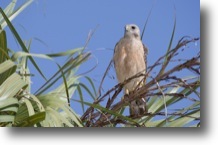This morning I
checked out of my Miami hotel and prepared for the long drive to the
Estero
/ Cape Coral region on the west coast. However, given my moderate
success yesterday at Shark Valley in photographing the purple
gallinules (a species I’m particularly fond of), I decided to stop
there along the way and try to get some more images of this very
interesting bird. I’m glad I did, because I got my best photo yet
of this attractive and unusual bird:
CLICK TO ZOOM
Purple gallinule at Shark
Valley. I love this low-over-the-water shot, because
it depicts the bird squarely in the context of its prime habitat.
(1/300sec 600mm f/5.6 ISO100)
Note that photographing this species can be
difficult, not only because of its habits (and habitat), but because
its plumage, particularly its dorsal plumage, can react negatively to
strong directional light (including
both artificial flash and direct sunlight). In birds, both blues
and irridescent colors achieved via structural/interference effects
can create unusual color artifacts in digital images. At present,
the only recommendation I can offer in these cases is to limit the use
of flash, and try to photograph the bird in non-direct sunlight.
In this particular case I was lucky, and few artifacts were visible.
More images of this bird can be seen below
(be sure to click the thumbnails to zoom to the full-sized image),
along with a nicely detailed shot of a red-shouldered hawk at close
range in the parking lot:
At one point there were as many
as 5 or 7 gallinules visible in the lily-pad-infested area of the canal
not far from the
trailhead. There were also little blue herons that approached
quite
close to me on the near shore (too close to focus, in fact) and a great
blue
hunting in the canal from the far side, as well as tons of
anhingas.
The action was mostly over by 10:30am, so I left at
11am and drove straight to Estero Island far to the north on the
western coast of
Florida. My goal was to hit either Little Estero Lagoon (where
I’d had great luck last year) or Sanibel
Island (where I’d had very
moderate luck last year). When I reached Estero Island I found a
dog park that is part of Lovers’ Key
State Park (see the map in
tomorrow’s blog entry). My dog loved it. There were plenty
of people and plenty of dogs, and all of them were having a great time
in the radiant sunlight and the delicious tropical waters.
After an hour or two we returned to the car and
drove the short distance to the main Lovers’
Key park entrance.
The fee was $4. I drove the circuit
without seeing a single bird (at 2:30 in the afternoon, mind
you). I then decided—somewhat
irrationally—to try for Sanibel
Island.
Although Sanibel was known in the past for being a
prime bird photography location, the word among Florida photographers
is that it’s no longer a good bet for fine-art bird photography.
Last year I paid the entry fee to the Ding
Darling refuge and didn’t
take a single photo there, though
with fairly extreme effort I was able to get a few really good bird
photos at the fisherman’s pier at the east end of the island.
Unfortunately (or perhaps fortunately), the traffic
heading toward Sanibel was so bad that I ended up sitting in traffic
for a good 40 minutes without moving more than about 10 or 20
feet. I ultimately lost my patience and bailed. Making a
U-turn, I headed south and found a quicker way off the island, and then
headed toward Cape Coral,
with its teeming population of burrowing owls
(another favorite bird of mine). The thumbnail below provides a
link to a map of burrowing owl sites published in 2005 by the city of
Cape
Coral for the benefit of visitors. The linked document also gives
suggestions for “owl-watching
etiquette”,
which I highly recommend reading and
adhering to.
CLICK TO
ZOOM
Official map of owl
nesting locations,
provided by the city of
Cape Coral.
In the late afternoon I arrived at
the Cape Coral
library, which has
traditionally been a very good site for finding owls. Last year I
found active nest sites both in front of the library and behind it, and
this year I found all of the same nests to be active again. The
first nest I worked was the one out front, which must surely receive a
lot of attention, as all traffic leaving the library parking lot for
the main highway has to drive mere feet from the birds. The birds
at this nest stayed down low at the entrance to their nest hole, and I
didn’t get any good shots of them. However, a woman who was
jogging by informed me that there was another nest behind the library
where the birds spent much more time above ground. I followed her
directions, and, sure enough, found that the birds at the second nest
spent much more time out in the open. I even saw them mating
several times. Due to the dim light I wasn’t able to get any good
photos (or at least, nothing to top last year’s shots), but with any
luck I should be able to get some great images here in the next few
days.
|











